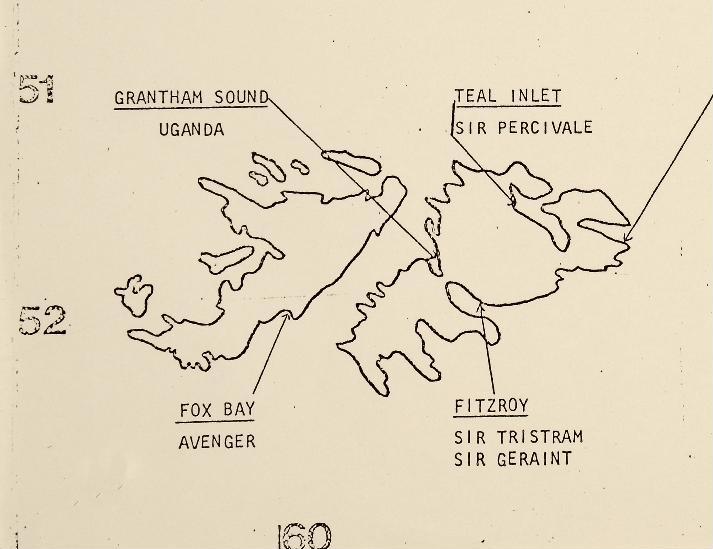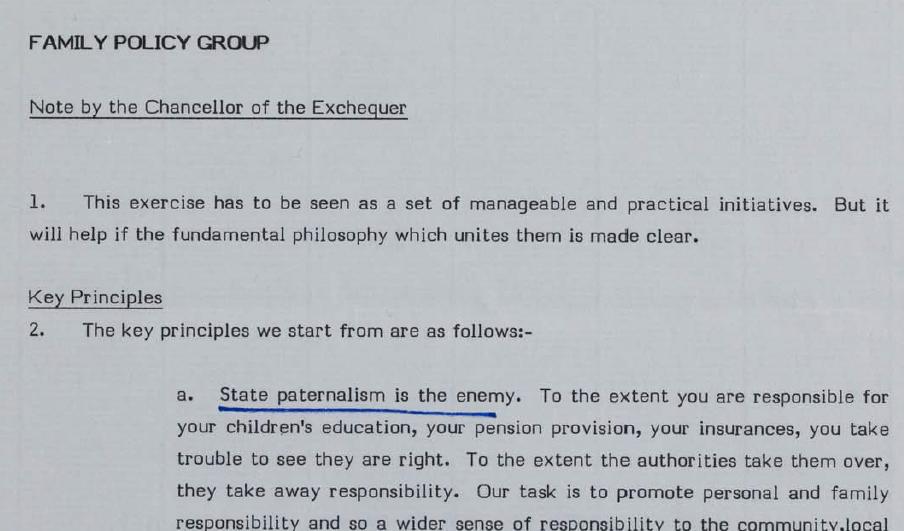Today, previously secret government files have been released and are now available to be viewed, either via our website or here at The National Archives. Amongst the files released, unsurprisingly, a huge number deal with the Falklands conflict, including documents from the Prime Minister’s Office, the Foreign and Commonwealth Office, and the armed forces. In total, around 6,000 files have been made available today. Many files relating to other issues are also available, including the disappearance of Mark Thatcher in the Sahara desert, the relationship between Margaret Thatcher and Ronald Reagan, and various domestic issues.

Falkland Islands (PREM 19/651)
One file that I found of particular interest is a Prime Minister’s Office file, PREM 19/793, in which senior Cabinet ministers discuss what they believe to be the causes of and solutions for the breakdown in society. This can be framed within the context of the urban riots in 1981, which politicians and commentators have attributed to a lack of social order, economic hardships, and poor race relations. While the Secretary of State for the Environment, Michael Heseltine, argued for the regeneration of inner city areas in Merseyside and the London Docklands, it was also deemed necessary to take a wider approach to understanding and treating the causes of the riots.
The file begins with policy lead Ferdinand Mount (who would go on to write the 1983 Conservative Party election manifesto) presenting to the Prime Minister the notion that it might be necessary to create a ‘Family Policy Group’ to begin the discussion around ‘renewing the values of society’. Mount also offers some of his own thoughts, suggesting greater autonomy for schools, that the ‘grammar of society’ (basic understanding of the law) should be improved, that the increase in the number of working mothers was leading to a number of ‘all-day latch-key kids’, requiring the release of school playing fields in the summer. He also launches an attack on the state of children’s television, describing programmes as ‘often lifeless, moral-less, mindless and themeless. They reduce life to a meaningless buzz of chatter.’
Indeed, what we see throughout the file, as the Family Policy Group is established and other Cabinet ministers proffer their opinions on society, is an increasing correlation between the government’s economic and social policies. More general, nebulous themes like ‘personal responsibility’ are tied into the economic aim of increasing private enterprise and choice. Chancellor of the Exchequer Geoffrey Howe proclaims that ‘State paternalism is the enemy’ and that ‘increasing private provision’ is a potential solution. Howe and Heseltine both suggest that a higher level of home ownership was necessary, and that the sale of council housing would assist with this (the Right to Buy had already been implemented in 1980).

Chancellor Howe's comments, underlined by the Prime Minister (PREM 19/783)
Mount had suggested that the Family Policy Group should offer practical and specific measures and should not be treated as some kind of ‘spiritual revival’. However, some ministers seem to have used the forum as an opportunity to espouse some of their long-held beliefs. David Howell, Secretary of State for Transport, spoke of how responsibility cannot be ‘shirked or passed on’ and that a ‘blame someone else’ culture can lead to ‘resentful collectivist brutality’, while Home Secretary Willie Whitelaw suggested that the ‘permissive climate of a decade or two ago’ was in retreat and that it should be remembered that ‘though some teachers are left-wing loonies…most are perfectly sensible and responsible and simply want a good lead’.
Keith Joseph, Secretary of State for Education and Science, who had previously received criticism for his comments on society, spoke of the rising trend of ‘irresponsible parents’ and said, ‘…personal responsibility has been eroded by a shift of housing, health, education and welfare provision excessively to the state, we are trying to shift the balance…’. Part of his solution is that – although ‘fraught with risks’ – the use of fear, in a similar way to anti-smoking campaigns should be used to deter young women from becoming pregnant.

Keith Joseph (PREM 19/783)
The reason I find this file particularly interesting is two-fold. First, it is very rare to find such personally held views expressed by senior politicians, particularly on such sensitive subjects. Even if similar discussions were held in Cabinet meetings, the summaries in Cabinet minutes would rarely provide such direct language. Second, the increased correlation between the government’s economic and social policies seems to demonstrate a greater degree of certainty of what the Cabinet wanted to achieve. That, through an integration of policies a more coherent political philosophy was emerging which, allied with increased popularity after success in the Falklands, contributed to landslide victory in the 1983 General Election.

I would argue that the comments highlighted above are not that rare but are often not highlighted, for example when Sir Keith Joseph pointed out that his staff were been paid less than the people who were being paid the benefits. It seems to us today ridiculous that Government should be putting forward policies based on ‘fear’ and that today such a suggestion would be opposed at the start. We should not forget that until the Falklands War that the Conservative Government was on its knees in the public’s views and that had both the Labour and Conservative Governments not cut back on spending the Falklands War might not have happened at all and history could have been much different and did they not recall the Argentinian invasion and landing on one of the islands in the early 1950s?. What I notice is that there is nothing about the huge cost of the Falklands campaign (we await the files from the Treasury) and the subsequent scrapping of Royal Navy vessels and therefore a full analysis cannot in my view be made.
Whilst the Conservative Government may have been more for private enterprise and the buying of council houses (people have now been saddled with huge repair costs) they like privatisation of the nationalised industries once sold could not be an addition to government finances again, a bit like selling off part of our gold reserve.